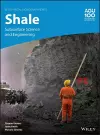
Shale
3 authors - Hardback
£161.95
Thomas Dewers' research interests and experience range from theoretical coupled thermal-mechanical-hydrological-chemical modeling, high temperature-high pressure and rock mechanics experimental methods, field investigations for geomicrobiology and hydrogeology, induced seismicity, and digital geologic mapping. Following graduation with PhD from Indiana University where he worked in the Department of Chemistry, he was a post-doc in the Center for Tectonophysics at Texas A&M. He then was appointed as a tenure-track and tenured professor at the University of Oklahoma School of Geology and Geophysics for thirteen years. After a short stint as a hydrogeologist for the State of New Mexico working on mining-related water quality issues, he joined Sandia National Laboratories as a Material Scientist and Principal Member of the Technical Staff, where he has worked since 2007. Current research at Sandia examines elasto-plasticity of pressure sensitive materials, acoustic tomography, aspects of subsurface carbon storage, multiphase flow, laser microscopy, coupled thermal-mechanical-hydrological-chemical model code development, and all things mudstone. Professional affiliations include the American Geophysical Union, the Society of Petroleum Engineers, and the Geochemical Society.
Jason E. Heath has M.S. and Ph.D. degrees in geology and hydrology, respectively, from Utah State University (2004) and New Mexico Tech (2010). He started working for Sandia National Laboratories (SNL) as a student intern in 2008 and converted to senior member of the technical staff in 2010. His research interests include the combination of shale geology, multiphase flow and transport, and natural isotopic tracers. He has authored papers on geologic CO2 sequestration, including pore-scale effects and large-scale storage capacity, and the impact of pore types on capillary breakthrough and sealing behavior of shale caprock. Current research includes using natural tracers, such as helium, to characterize hydraulically-fractured shale oil and gas systems and forecast production decline. Professional affiliations include the American Geophysical Union, the Society of Petroleum Engineers, and the Rocky Mountain Association of Geologists.
Marcelo Sanchez was appointed as an Associated Professor in the Zachry Department of Civil Engineering at Texas A&M in September 2009. He obtained his first degree in Civil Engineering from Universidad Nacional de San Juan (Argentina). His Master (1996) and Ph.D. (2004) degrees are from the Universidad Politecnica de Catalunya (UPC, Barcelona, Spain). His expertise lies in the analysis of Thermo-Hydro-Mechanical and Chemical (THMC) coupled problems in geological media. His effort focuses on advanced geomechanics, considering engineering problems involving mechanical, hydraulic, thermal, and geochemical couplings. Specific challenges include: design of high level nuclear waste disposals; behavior of hydrate bearing sediments, design of compressed air energy storage (CAES) systems; hydraulic fracturing; CO2 sequestration, desiccation cracks in soils; and the design of energy piles. He is the chairman of the Technical Committee TC308 on Energy Geotechnics of the International Society of Soil Mechanics and Geotechnical Engineering (ISSMGE).